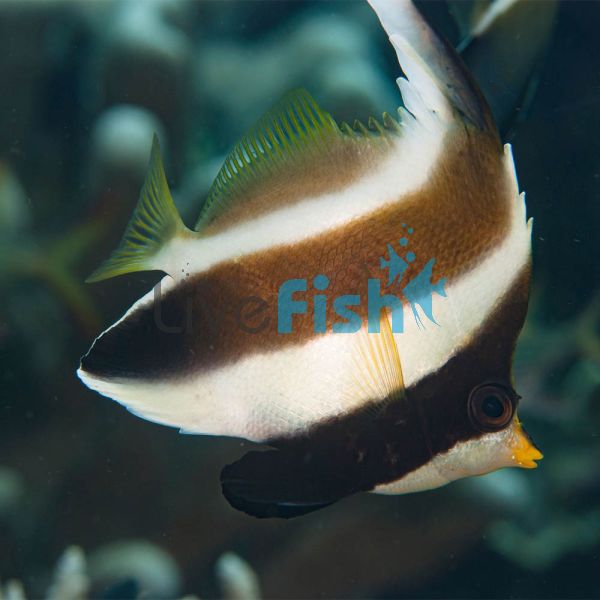Bannerfish Pennant - Medium
Pennant Bannerfish are active fish, constantly swimming in open water in search of their next meal. It is still peaceful and sociable and won’t cause problems with other tankmates.
The Pennant Bannerfish can be identified by their colouration. It is white with a black band running across the head and through the ventral fins. Two brown bands run down the body. The snout is bright yellow (chryso [Greek] - gold, stoma [Greek] - mouth). An expanded pennant is supported by the fourth dorsal fin spine.
The Pennant Bannerfish is a relatively small fish with a maximum size of 25 cm. The average size observed in nature, however, oscillates around 15 cm.
The Pennant Bannerfish prefers relatively deep waters from the protected lagoon, channels, or outer reef slopes ranging in depth from 15 to 75 meters. They can be found singly or in pairs over coral-rich reef flats, lagoons, and seaward reefs. It is found in the western and southern Pacific Oceans. It has been observed in Australia from Western Australia's central coast to the tropical north (except for the Gulf of Carpentaria) and south to Sydney, New South Wales.
Tank Recommendations for Pennant Bannerfish
The Pennant Bannerfish can be kept in shallow or deep water tanks. This species requires more time to adjust to captivity (recommended 4 weeks, or until eating aggressively). It should be kept with small peaceful tankmates and will not acclimate if harassed or if the aquarist is too active in or around the tank. This fish prefers an environment with plenty of hiding places. This Pennant Bannerfish are very active and robust. A tank capacity of at least 400 litres is recommended.
Suitable Tank Buddies
This species of Butterflyfish, Heniochus, are generally referred to a Bannerfish. These fish are extremely hardy and thrive in the home aquarium. They will eat almost anything, but corals are a favourite. If you decide to keep one in your reef tank, you must keep a close eye on it. They can get into fights with members of the same species sometimes. Younger fish live in groups in nature (they are often of various sizes). Adults either live alone or in pairs. You can keep them in groups in your aquarium if the individuals you choose are very young and were all introduced into the aquarium at the same time.
Usually Compatible
This fish's sociability is excellent, which means it is usually compatible with a wide range of aquarium fish, including Angelfish, Anthias, Boxfish, Hogfish, Clownfish, Parrotfish, and many others.
Sometime Compatible
The Pennant Bannerfish may behave in a similar manner to other fish in your tank. This can irritate and even stress them out if the harassment is too close to home. This behaviour is most noticeable in younger specimens. So keep an eye on them to ensure they don’t annoy their tank mates too much. The Pennant Bannerfish is can be compatible with Wrasse, Tangs, Triggerfish, and Filefish in a large enough aquarium.
Rarely Compatible
They ignore most other fish and are generally peaceful, so multiple Butterflyfish will get along fine. However, unless they are a couple, keeping similar species together should be avoided. These Bannerfish aren’t compatible with Groupers, Sharks or other large predators that are likely to eat them. Seahorses or Pipefish aren’t good to mix with them either as they will compete for the same food resources which could result in your Seahorse or Pipefish starving.
Feeding your Pennant Bannerfish
This fish requires several feedings per day, especially if it is new. When the fish can find its natural food in the aquarium, it requires less frequent feeding. Its diet should include herbivore preparations as well as a variety of meaty items. It is a vegetarian fish, but in the aquarium will adapt to a more meaty diet. Feed it raw or scalded mussels, brine shrimp, mysus, krill, shrimp or fish items, nereis, tubifex, and mosquito larvae in live or frozen form.
| Scientific Name | Heniochus chrysostomus |
|---|---|
| Care Level | Moderate |
| Common Names | Bannerfish, Coralfish, Horned Bannerfish, Horned Coralfish, Pennant Butterflyfish, Pennantfish, Three-band Pennant, Three-band Pennant Butterflyfish, Three-band Pennant Coralfish, Three-band Pennantfish, Three-band Pennantfish, Three-band Pennantfish, Thr |
| Diet | Omnivore |
| Fish Family | Chaetodontidae - Heniochus |
| Lifespan (years) | 5 |
| Max. Length (cm) | 25 |
| Min. Tank Volume (l) | 400 |
| Origin | Western and southern Pacific, Australia |
| Reef Safe | No |
| Sociability | Peaceful |
| Venomous | No |
| Water Conditions | 22.3-31.2°C pH : 8.2 - 8.4 |




